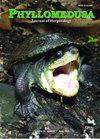Behavioral responses of laboratory-reared and wild-caught Polypedates maculatus (Anura: Rhacophoridae) tadpoles to dietary cues from the carnivorous tadpoles of Hoplobatrachus tigerinus (Anura: Dicroglossidae)
IF 0.6
4区 生物学
Q4 ZOOLOGY
引用次数: 0
Abstract
The behavioral responses of laboratory-reared and wild-caught tadpoles of Polypedates maculatus to predatory tadpoles of Hoplobatrachus tigerinus were studied in the laboratory. The predator’s diet-derived metabolites released in excreta of predator after consumption of P. maculatus tadpoles were used to simulate predation threat. Both laboratory-reared and wild-caught tadpoles of P. maculatus showed antipredator behavioral responses i.e., reduced swimming movements and overall time spent in swimming and had a higher burst speed in response to water borne dietary cues of predators. Further, the antipredator responses of wild-caught tadpoles were significantly higher than those exhibited by laboratory-reared tadpoles. The studythus shows that antipredator behavior in these tadpoles is innate. Further, an enhanced antipredator behavior of wild-caught tadpoles may suggest their prior experience with predators in natural waters.实验室饲养和野外捕获的斑足蛙蝌蚪对虎足蛙食性蝌蚪食物线索的行为反应
实验研究了实验室饲养和野外捕获的斑纹足跖蝌蚪对虎足跖蝌蚪的行为反应。利用捕食者进食斑纹小蝌蚪后排泄物中释放的食性代谢物来模拟捕食威胁。实验饲养和野外捕获的斑纹小蝌蚪对捕食者的水中食物提示均表现出反捕食者行为反应,即游泳动作和总游泳时间减少,爆发速度加快。此外,野生捕获的蝌蚪的反捕食反应显著高于实验室饲养的蝌蚪。因此,研究表明这些蝌蚪的反捕食行为是天生的。此外,野生捕获的蝌蚪的反捕食者行为增强可能表明它们先前在自然水域与捕食者的经验。
本文章由计算机程序翻译,如有差异,请以英文原文为准。
求助全文
约1分钟内获得全文
求助全文
来源期刊

Phyllomedusa
ZOOLOGY-
CiteScore
1.00
自引率
25.00%
发文量
0
审稿时长
24 weeks
期刊介绍:
PHYLLOMEDUSA publishes original research articles, short communications and review papers concerning the whole field of Herpetology. PHYLLOMEDUSA also maintains sections for Book Reviews. Manuscripts will be considered on condition that they have not been published elsewhere or are not under consideration for publication, in whole or in part, in another journal or book. Publication inPHYLLOMEDUSA, including color pictures, is free of charge. All manuscripts are subject to peer review. This process averages 90 days. Authors receive pdf proofs before publication and 30 reprints free of charge. Full-text pdf versions of all articles are available for free download in this homepage.
 求助内容:
求助内容: 应助结果提醒方式:
应助结果提醒方式:


